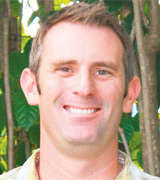Everyone Can Help Keep Pollution From Our Shorelines
By Todd Cullison
E-mail this story | Print this page | Comments (0) | Archive | RSS | Share
 Del.icio.us
Del.icio.usAs we think of good times spent at the beach, the main thing that draws us to the area — the ocean — is perhaps what we take for granted the most.
By and large Hawaii beaches are clean and safe to swim in, yet we all have seen the warning signs:“Contaminated water, Beach closed.” The Natural Resource Defense Council’s 2010 report, Testing the Waters, which looks at beach closures and ocean pollution nationwide noted, “99 percent (2,340) of closing/advisory days were from storm-water runoff and 1 percent (12) were from sewage spills/leaks in Hawaii in 2009.”

|
“Why is my beach water polluted?” we ask, or “What can I do to protect my favorite beach?”The answers are fairly simple.
Ocean water is polluted from a variety of sources. People often think about industrial waste, farming, sewer collection systems and large environmental problems such as oil spills as a leading cause.These types of land uses and catastrophes do have an impact, often referred to as point-source pollution — a source you can point your finger at and say, “See, this is degrading water quality!”
Hawaii, however, is without significant industrialization, has limited agriculture and a lack of off-shore oil production. Yet beaches still close because of what’s called non-point source pollution, or storm-water runoff. It’s all around us, yet hard to detect.
How does it degrade water quality? Following rains, water lands on hard surfaces, such as parking lots,roads and rooftops and carries pollution that’s accumulated in these areas to our storm drains, into our streams and ultimately to the ocean. Along the way, the once-clean rainwater picks up oil from leaking cars in parking lots and driveways, pesticides and fertilizers from residential areas, dirt from eroding stream banks or construction sites, bacteria from pet and animal waste and rubbish.
These pollutants impact the amount of oxygen marine species have to breathe. Sediment smothers productive coral reefs, trash sits on our favorite beach, and harmful bacteria finds its way to our swimming areas.
Thankfully there are many actions homeowners can take to protect our beaches for generations to come. Hui o Koolaupoko recommends the following: 1) Wash your car on the grass, not the driveway. This allows soap, often high in phosphorus, to infiltrate the soil and not run off directly into storm drains. 2) Sweep your driveway and sidewalks. Don’t hose rubbish into the street with water; it drains to the ocean. 3) Plant native vegetation. Native plants use less water and are more resistant to pests, requiring less pesticide. 4) Pick up animal waste and dispose of it properly. This decreases the amount of bacteria entering the storm drains.
Simple changes in our daily lives as well as the community making water quality as a priority will have positive impacts. Remember, in order to keep our oceans clean,“treat every road like a river and every curb as a shoreline.” If not, you might end up surfing with the rubbish that washed from the street, entered the storm drain, flowed downstream and found its way into the ocean.
Todd Cullison is executive director of Hui o Ko‘olaupoko, a nonprofit that implements projects from Makapuu to Kualoa, addressing land-based pollution and watershed health as they impact water quality and the receiving waters of Waimanalo, Kailua and Kaneohe Bay. For more information, call 277-5611. Also, from 9 to 11 a.m. this Saturday, the group seeks volunteers for Water Quality Snapshot Day at Kualoa Beach Park. Monitors will test the waters and collect data to share with the world. Call 381-7202 to sign up.
E-mail this story | Print this page | Comments (0) | Archive | RSS
Most Recent Comment(s):













